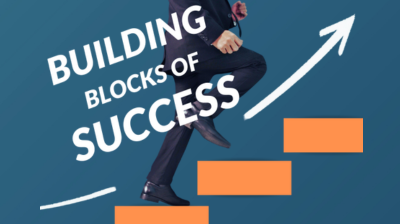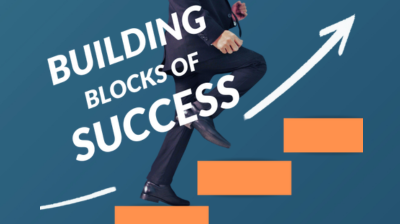The content of this recording is copyrighted by Sandler Systems, LLC. All rights reserved.
Transcript
Glenn Mattson
Building Blocks of Success season three, now we're going to be taking a look at session seven, Setbacks. Now, when we take a look at setbacks, setbacks, obstacles, roadblocks, anything that you want to call it all as the same definition. The definition is we got an outcome that was different than what we're hoping for. So a setback, we really got to make sure that we're on the same page about a few things, because it's really crucial to adapt a growth mindset and when we're looking at setbacks. I mean, look, we've all been there where we have goals, doesn't make a difference what they are, it could be personal, it could be health, could be work, could be financial, could be a depth of an account, you want to get into could be just getting over a phone call, whatever it is, we all have goals. On the way to those goals and accomplishing those goals. There's a path and that path is not flat and easy. That path historically take some pretty big bumps in the road, that path historically is going to have setbacks. And for many of us how we view that that setback is how we're going to have a capacity or a higher propensity for success.
Glenn Mattson
So I just have to take a look at is if you have goals, man, you want to get someplace, how can you honestly think you're not going to have setbacks? How do you think you're not going to fall off the horse once in a while? How can you think that your plan is so ingenious that you've thought of everything, with no possibilities of having to pivot. Pivots, just going into a direction that wasn't part of your plan. So I don't understand why people don't plan for obstacles, why they don't plan for setbacks. You know, so one of the things that we have to do is when we look at setbacks, you got to realize that vision is where you want to be in a certain time period. What does that look like? So with a great vision, we're gonna have a lot of effort. Remember, time, energy and effort is what gets results. So if you put a lot of effort into what you're doing, there's going to be risks. So when you put a lot of effort in, you got to make decisions, you got to do things. And when you're taking that, those risks, every opportunity, right, every situation has two inherent outcomes.
Glenn Mattson
Either it's going to be success, or it's going to be a lesson. So every time we risk, right, some of us worry, some of us has fears, some of us have I don't want to be embarrassed. Others of us look at risk as an opportunity to grow. We look at risking as well. If I risk and it doesn't work out, I've just learned a way how not to do it. How not to do it. So risking is part of your goals, your goals, you get to vision, you get your effort, you got risk taking, obviously. And with that comes challenges. So when you look at challenges, when you hit a roadblock, what do you do? Are you saying to yourself to give up? Or you're saying to yourself, why me? Or you're saying to yourself, this always happens? Or do you embrace it? See, when you look at this word that we have out now in our growth mindset, fixed mindset, we have, you know, winners, at leasters, and non-winners, all these different terms that people have, that are doing with psychology and where you are mentally does dictate everything you do externally. So, internally, if you look at challenges as a negative if you look at it as you mean you failed, if you saw challenges as, oh my God, here we go again, you know, you were so close. Now you can't be successful. Whatever our scripts are, whatever our little write up of our head is, of when we hit a challenge that actually dictates our success. So challenges and roadblocks don't really, they don't set us up for failures or successes, what they do is, they give us the opportunity, they give us the ability to learn from it if we see the opportunity to learn.
Glenn Mattson
So, when we're looking at challenges, I just want to make sure we're on the same page that you gotta have a growth mindset. That's number one. Growth mindset is really about the fact that embrace the belief that setbacks are not failures, but they're stepping stones. Look at challenge as an opportunity to learn and pivot and go in a different direction. So I'm not going to spend a lot of time on the failure part, you know, I've gone over that a lot in other podcasts, right? But every time you take a risk, you're going to succeed or you're not. And if you think the not part is failure, you're going to take very low risks. And you're going to look at challenges as a punch in the gut.
Glenn Mattson
So make sure that you understand that a setback is not a failure. All a setback is means you have to change directions on where you're going, just like in Waze. You're driving down the road, there's an accident Waze will turn around and tell you you got three different options go this way, go that way, go this way. So challenges are opportunities. So not negative.
Glenn Mattson
Now, when we have this opportunity, right, from a challenge standpoint, from a setback standpoint, what we really want to do is, is learn from it. And that's called reflection. So let me share a few things about reflection. Now, when we have the ability to reflect or take a look at what we did, or how we did it, there are a couple of things you got to make sure. So for instance, if we look at failure, the five steps of failure, right is disbelief, I can't believe that just happened, then you get fearful, oh, my God, what does that mean? Then you get angry, then you accept it, and you have a little bit of despair. Now, with a setback, what we want to do is go through that anatomy very quickly and have the ability to speed through what that is. So don't look at your ability from a setback to see it as a failure. Again, it's really just gives you the opportunity on how to do things differently. That's really what it is.
Glenn Mattson
One of the things we want to do is reflect, so take the time to analyze what went wrong, what factors contributed to that setback, and what can you learn from it? So when you reflect, it is really important to take ownership. You can't blame the economy; you can't blame the product. So when you reflect back, you have to be very stoic in what you ask. So here's one question. What did I do? What did I say that I shouldn't have? Something I didn't do, or I didn't say that I should have. Look at your ability to take a stoic look at a setback. More times than not your setbacks can be you, can be caused by you, be created by you, can be solved by you. So for us to take a look at a setback, last thing you want to do is make excuses. Stop blaming outside forces. You gotta have the ability to own it. Now, you've heard me say this in the past, the five questions you always want to ask yourself when you sit back and reflect. So you do have to say what went well, but before we get to that, first question, you should say yourself is alright, what could I have done better? Two, what could I have done differently? Three, what do I need to do more of? Four, what do I have to stop doing? Five is what do I have to start doing?
Glenn Mattson
Take stock, and not defending the scenario. But look at the scenario and look at it as if you're a third person to say, okay, what could have been done differently? Do I need to send out the email? Did I need to let them know ahead of time this was going to happen? So by taking ownership, it gives you the ability to address and learn from it much faster.
Glenn Mattson
So first is gotta look at your growth mindset. Right? Make sure that you understand that setbacks are natural. What you do with a setback determines who you're going to be. So the successful person doesn't like setbacks any more than an unsuccessful mindset. It’s just that a successful person understands we're going to have setbacks, so they're not challenged by them. They don't get them off kilter, they don't have to sit down for seven days because of an email that went out. Right? So they learn how to take action relatively quickly.
Glenn Mattson
Second thing is you got to learn how to reflect. Reflect really is sitting back and taking stock of what you did or didn't do, what you should have done or should not have done and learning from it. And then as you learn from it, you have to let it go. It's one of the keys of setbacks, learn your lesson and let it go. If not, you're gonna have guilt, no reason for it.
Glenn Mattson
Third thing you want to do with setbacks is resiliency, right? Resiliency is the ability to bounce back from setbacks. Is stay persistent, you get determined in the face of adversity. You know, cultivating that resiliency by focusing on your long term vision is really important. Now, when you look at resiliency, realize that people that have high resiliency view change or challenges as an opportunity. They recognize their own limits by the way of control. They also have the ability to understand goals. And the path to get there is never a linear path. It's up and down. It's like a mountain range. Characteristics of resilient people also are they're very tolerant of negative effects. They're tolerant of criticism. The other is they're very action oriented. And they don't mind change. So high resilient, people look at change as opportunities.
Glenn Mattson
The individuals who have low characteristics, right, the kind of depressed, they feel victimized, the hopeless, they're disconnected. It's like I had nothing I can do to make a change. Now, the neat thing about resiliency is we're kind of born with resiliency, but we can also be learned, right?
Glenn Mattson
Look, resiliency, there's three types, you have natural resiliency, that's the one you had as a kid. And quite honestly, none of us could walk if we didn't have resiliency. You're a little kid, you stand up, you fall over, you get back up, you start walking again, you fall over, you get back up, you start walking and fall over. So we do have a natural tendency to have a level of resiliency.
Glenn Mattson
We also have adapted. Adapted is about resiliency occurs when a challenging circumstances or something put you into that; you have to adapt, right? Maybe you're resilient on the fact that you're out in the middle of nowhere, your car broke down, you have no gas. After you spend two seconds saying what the heck is going on. You take a deep breath and say, okay, let's figure this thing out. You take stock of where you are and what you have to do and start moving.
Glenn Mattson
The third piece of our resiliency is called restored. Restored resiliency is the cool part. That's the one that resiliency that you had when you were a kid actually comes back into your brain and you use it as an adult. So resilience is important. You do need to have your vision. You need to have long term goals. But resiliency is really about the ability to be knocked down and get back up. Now some would say grit or determination or fortitude or tenacity, right or guts. You know self-discipline is no matter what your push forward. Tenacity is that mental and moral strength to resist hardship. What about fortitude? It's the mind, right? It's the strength of your mind to encounter pain and diversity with courage. That's fortitude, right? You get knocked down, stand back up, knocked down, stand back up. Determination. There's no matter how difficult it is, you're still going to climb that mountain, right? So these things are all these things are success, but resiliency is really important for us. And when you look around, one of the things I also want to share with you about setbacks and being resilient is how we look at and how we prepare ourselves. And what I mean by all that craziness is this.
Glenn Mattson
One of the things I'd like you to take a look at is that when we go to bed the last things you're thinking about are the things that you'll think about during the nighttime. So when we look at setbacks, we have a tendency to do a lot of shoulda, coulda, woulda and why didn't ya? Now all that's really doing is exposing the setbacks on what occurred, not what we need to do to move forward. So what we want to do is convert setbacks to two things. One is to learn from them and the other is to change your record and when they occur. So when you have a setback, you've heard me say this in the past, you shouldn't be saying things like, good. This is great that this happened, not what I wanted to happen or when I wanted to happen, but at least now we know. So setbacks give you the option to take stock on where you are, and what you need to do to move forward. So as you start looking at your life, being an entrepreneur.
Glenn Mattson
What's funny, I was talking with someone the other day. And he said, you know, to think one of the critical signs of a successful entrepreneur is just how much crap can they handle, how much crap can be put on their plate. And then as things start to go well, they get knocked down to their feet. It's the ability to get back up, it's the ability to move forward, it's the ability to take action. It's the reason that 50% of all first time business owners, right, they don't make the first year, another 50% don't make it by the fifth year. That's a massive amount of people that don't make it the first three or four years. Because they don't have the ability to stick it out. They don't have the ability to hit a roadblock, and then say, okay, then keep moving. Instead of sitting on a curb, you just take it, you absorb it, it's okay. What do we have to do to get it back on track? And then once it gets back on track, then you sit back and then you take stock on what happened or didn't happen. And that's where your lessons are. You've heard me say this a million times, and I'll say it a million more. Every day, on the way home from work, every day when you're done from work. You should be asking yourself, what do I have to stop doing, what do I have to start doing? What can I do better, where can I do more, what can I do different?
Glenn Mattson
So as you start to go through and you reflect on where you want to be with your career. Next time you face a setback. Remember, it's an opportunity in disguise. Embrace your growth mindset. Reflect on your experiences. Cultivate that resiliency inside of you. Look for a support group. They can help dramatically. Setbacks are an integral part of your journey. It's an integral part of your success. Keep pushing yourself forward and never stop learning. Thank you for joining me today. Stay tuned for more insights on Building Blocks of Success.
Glenn Mattson
This is the Building Blocks of Success with Glenn Mattson.






